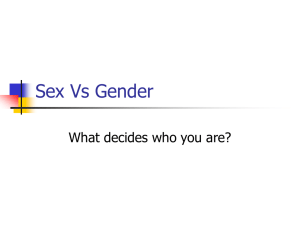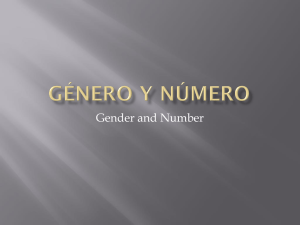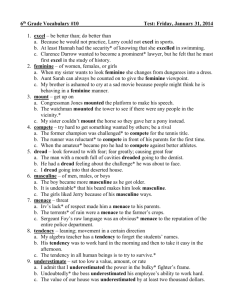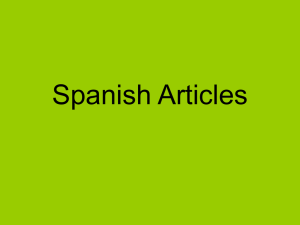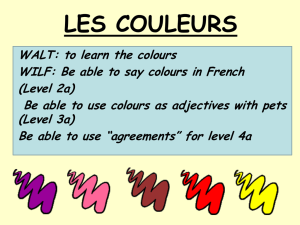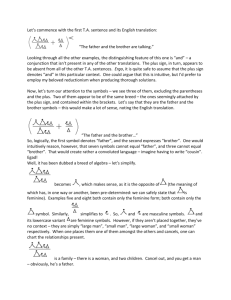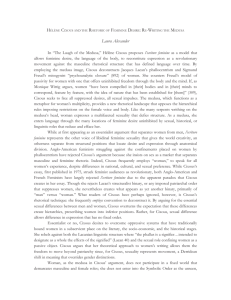Cixous
advertisement
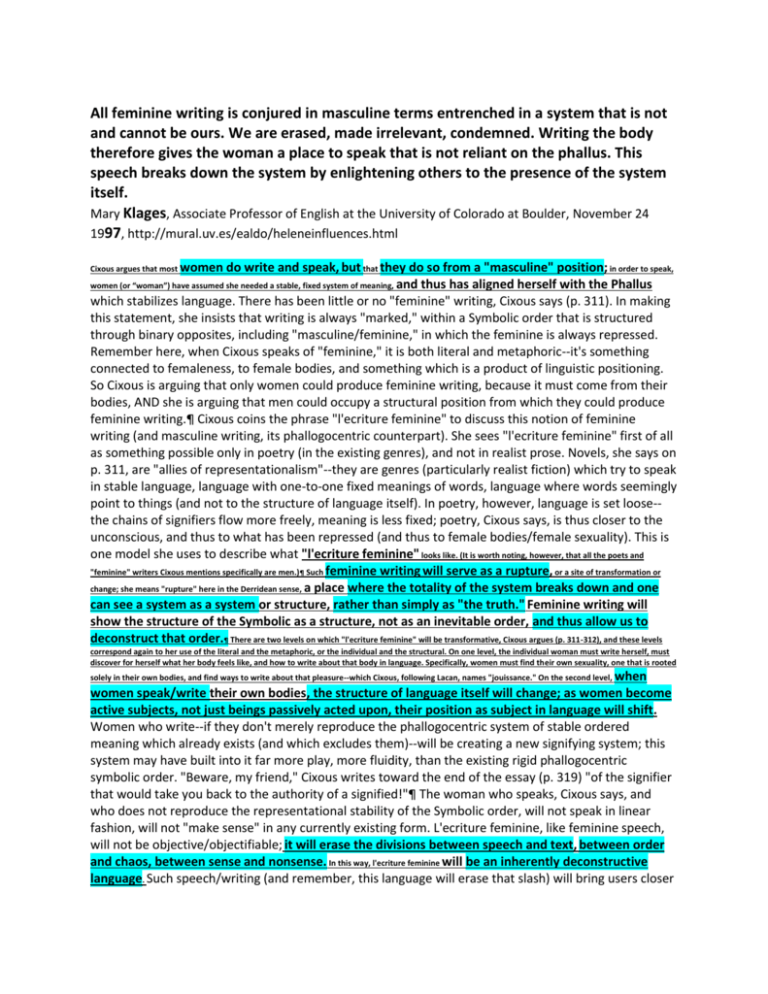
All feminine writing is conjured in masculine terms entrenched in a system that is not and cannot be ours. We are erased, made irrelevant, condemned. Writing the body therefore gives the woman a place to speak that is not reliant on the phallus. This speech breaks down the system by enlightening others to the presence of the system itself. Mary Klages, Associate Professor of English at the University of Colorado at Boulder, November 24 1997, http://mural.uv.es/ealdo/heleneinfluences.html Cixous argues that most women do write and speak, but that they do so from a "masculine" position; in order to speak, thus has aligned herself with the Phallus which stabilizes language. There has been little or no "feminine" writing, Cixous says (p. 311). In making this statement, she insists that writing is always "marked," within a Symbolic order that is structured through binary opposites, including "masculine/feminine," in which the feminine is always repressed. Remember here, when Cixous speaks of "feminine," it is both literal and metaphoric--it's something connected to femaleness, to female bodies, and something which is a product of linguistic positioning. So Cixous is arguing that only women could produce feminine writing, because it must come from their bodies, AND she is arguing that men could occupy a structural position from which they could produce feminine writing.¶ Cixous coins the phrase "l'ecriture feminine" to discuss this notion of feminine writing (and masculine writing, its phallogocentric counterpart). She sees "l'ecriture feminine" first of all as something possible only in poetry (in the existing genres), and not in realist prose. Novels, she says on p. 311, are "allies of representationalism"--they are genres (particularly realist fiction) which try to speak in stable language, language with one-to-one fixed meanings of words, language where words seemingly point to things (and not to the structure of language itself). In poetry, however, language is set loose-the chains of signifiers flow more freely, meaning is less fixed; poetry, Cixous says, is thus closer to the unconscious, and thus to what has been repressed (and thus to female bodies/female sexuality). This is one model she uses to describe what "l'ecriture feminine" looks like. (It is worth noting, however, that all the poets and "feminine" writers Cixous mentions specifically are men.)¶ Such feminine writing will serve as a rupture, or a site of transformation or change; she means "rupture" here in the Derridean sense, a place where the totality of the system breaks down and one can see a system as a system or structure, rather than simply as "the truth." Feminine writing will show the structure of the Symbolic as a structure, not as an inevitable order, and thus allow us to deconstruct that order.¶ There are two levels on which "l'ecriture feminine" will be transformative, Cixous argues (p. 311-312), and these levels women (or “woman”) have assumed she needed a stable, fixed system of meaning, and correspond again to her use of the literal and the metaphoric, or the individual and the structural. On one level, the individual woman must write herself, must discover for herself what her body feels like, and how to write about that body in language. Specifically, women must find their own sexuality, one that is rooted solely in their own bodies, and find ways to write about that pleasure--which Cixous, following Lacan, names "jouissance." On the second level, when women speak/write their own bodies, the structure of language itself will change; as women become active subjects, not just beings passively acted upon, their position as subject in language will shift. Women who write--if they don't merely reproduce the phallogocentric system of stable ordered meaning which already exists (and which excludes them)--will be creating a new signifying system; this system may have built into it far more play, more fluidity, than the existing rigid phallogocentric symbolic order. "Beware, my friend," Cixous writes toward the end of the essay (p. 319) "of the signifier that would take you back to the authority of a signified!"¶ The woman who speaks, Cixous says, and who does not reproduce the representational stability of the Symbolic order, will not speak in linear fashion, will not "make sense" in any currently existing form. L'ecriture feminine, like feminine speech, will not be objective/objectifiable; it will erase the divisions between speech and text, between order and chaos, between sense and nonsense. In this way, l'ecriture feminine will be an inherently deconstructive language. Such speech/writing (and remember, this language will erase that slash) will bring users closer to the realm of the Real, back to the mother's body, to the breast, to the sense of union or nonseparation. This is why Cixous uses (p.312) the metaphor of "white ink," of writing in breast milk; she wants to convey that idea of a reunion with the maternal body, an unalienated relation to female bodies in general.¶ Cixous' descriptions of what "l'ecriture feminine" looks like (or, better, sounds like, since it's not clear that this writing will "look like" anything--since "looking like" is at the heart of the misperception of self in the Mirror Stage which launches people into the Symbolic order) flow into metaphors, which she also means literally. She wants to be careful to talk about writing in new ways, in ways that distinguish l'ecriture feminine from existing forms of speech/writing, and in so doing she is associating feminine writing with existing non-linguistic modes. So, for instance, l'ecriture feminine is milk, it's a song, something with rhythm and pulse, but no words, something connected with bodies and with bodies' beats and movements, but not with representational language.¶ She uses these metaphors also to be "slippery", arguing (p. 313) that one can't define the practice of "l'ecriture feminine." To define something is to pin it down, to anchor it, to limit it, to put it in its place within a stable system or structure--and Cixous says that l'ecriture feminine is too fluid for that; it will always exceed or escape any definition. It can't be theorized, enclosed, coded, or understood --which doesn't mean, she warns, that it doesn't exist. Rather, it will always be greater than the existing systems for classification and ordering of knowledge in phallogocentric western culture. It can't be defined, but it can be "conceived of,"--another phrase which works on literal and metaphoric levels--by subjects not subjugated to a central authority. Only those on the margins--the outlaws--can "conceive of" feminine language; those outlaws will be women, and anyone else who can resist or be distanced from the structuring central Phallus of the phallogocentric Symbolic order. Women have rejected their bodies and their identities because we have been told to. We have been made to believe that we are the unknowable other, whose place in this masculine world is to be silent. Only the writing method of the 1AC can attend to the ways in which woman, more than man, is paradoxically trapped within and estranged from her body. The writing of the body is a form of rupturing through language that ends the Age of the Phallus at the risk of ending the self- the explosive writing is worth the risk because through writing our feminine body, we disrupt this phallocentrism. This feminine writing allows for a recording of a new history free of the binary, and embraces the bisexuality of life Hélène Cixous, professor at European Graduate School in Saas-Fee, Switzerland and the University of Paris VIII and A.D. White Professor-at-Large at Cornell University, 1986 “Sorties: Out and Out: Attacks/Ways Out/Forays,” (94-97) We have turned away from our bodies. Shamefully we have been taught to be unaware of them, to lash them with stupid modesty; we’ve been tricked into a fool’s bargain: each one is to love the other sex. I’ll give you your body and you will give me mine. But which men give women the body that they blindly hand over to him? Why so few texts? Because there arc still so few women winning back their bodies. Woman must write her body, must make up the unimpeded tongue that bursts partitions, classes, and rhetorics, orders and codes, must inundate, run through, go beyond the discourse with its last reserves, including the one of laughing off the word “silence” that has to be said, the one that, aiming for the impossible, stops dead before the word “Impossible” and writes it as “end.” In body/Still more: woman is body more than man is. Because he is invited to social success, to sublimation. More body hence more writing. For a long time, still, bodily, within her body she has answered the harassment, the familial conjugal venture of domestication, the repeated attempts to castrate her. Woman, who has run her tongue ten thousand times seven times around her mouth before not speaking, either dies of it or knows her tongue arid her mouth better than anyone. Now, I-woman am going to blow up the Law: a possible and inescapable explosion from now on; let it happen, right now, in language. When “The Repressed” of their culture and their society come back, it is an explosive return, which is absolutely shattering, staggering, overturning, with a force never let Loose before, on the scale of the most tremendous repressions: for at the end of the Age of the Phallus, women will have been either wiped out or heated to the highest, most violent, white-hot fire. Throughout their deafening dumb history, they have lived in dreams, embodied but still deadly silent, in silences, in voiceless rebellions. A feminine text cannot be more than subversive: if it writes itself it is in volcanic heaving of the old real” property crust. In ceaseless displacement. She must write herself because, when the times comes for her liberation, it is the invention of a new, insurgent writing that will allow her to put the breaks and indispensable changes Into effect in her history. At first, individually, on two inseparable levels: —woman, writing herself, will go back to this body that has been worse than confiscated, a body replaced with a disturbing stranger, sick or dead, who so oft is a bad influence, the cause and place of inhibitions. By censuring the body, breath and speech are censored at the same time. ¶ To write—the act that will realize” the un-censored relationship of woman to her sexuality, to her Woman-being giving her back access to her own forces; that will return her goods, her pleasures, her organs, her vast bodily territories kept under seal; that will tear her out of the superegoed over-Mosesed structure¶ where the same position of guilt is always reserved for her (guilty of everything, every time: of having desires, of not having any, of being frigid, of being “too” hot; of not being both at once; of being loo much of a mother and not enough; of nurturing and of not nurturing . . ). Write yourself: your body must make¶ itself heard. Then the huge resources of the unconscious will burst out. Finally the inexhaustible Feminine Imaginary is going to be deployed. Without gold or black dollars, our naphtha will spread values over the world, un-quoted values that will change the rules of the old game. Society and debate wage a constant war against woman. She is unthinkable and unwritten in the status quo. Hierarchies, violence, and male privilege order and erase her just as the world is structured upon her degradation and subjugation- this is the ultimate impact. Hélène Cixous, professor at European Graduate School in Saas-Fee, Switzerland and the University of Paris VIII and A.D. White Professor-at-Large at Cornell University, 1986 “Sorties: Out and Out: Attacks/Ways Out/Forays,” (64-65) Theory of culture, theory of society, symbolic systems in general —art, religion, family, language—it is all developed while bringing the same schemes to light. And the movement whereby each opposition is set up to make sense is the movement through which the couple is destroyed. A universal battlefield. Each time, a war is let loose. Death is always at work. Father/son Relations of authority, privilege force. The Word/Writing Relations: opposition, conflict, sublation, return, Master/slave Violence. Repression. We see that “victory” always comes down to the same thing: things get hierarchical. Organization by hierarchy makes all conceptual organization subject to man. Male privilege, shown in the opposition between activity and passivity, which he uses to sustain himself. Traditionally, the question of sexual difference is treated by coupling it with the opposition; activity/passivity. There are repercussions. Consulting the history of philosophy— since philosophical discourse both orders and reproduces all thought—one notices’ that it is marked by an absolute constant which orders values and which is precisely this opposition, activity /passivity. Moreover, woman is always associated with passivity in philosophy. Whenever it is a question of woman, when one examines kinship structures, when a family model is brought into play. In fact, as soon as the question of ontology raises its head, as soon as one asks oneself “what Is it?,’ as soon as there is intended meaning. Intention; desire, authority-examine them and you are led right back . . . to the father, It is even possible not to notice that there is no place whatsoever for woman in the calculations. Ultimately the world of “being” can function while precluding die mother. No need for a mother, as long as there is some motherliness: and it is the father, then, who acts the part, who is the mother. Either woman is passive or she does not exist. What is left of her is unthinkable, unthought. Which certainly means that she is no thought, that she does not enter into the oppositions, that she does not make a couple with the father (who makes a couple with the son). There is Mallarmé’s tragic dream,’ that father’s lamentation on the mystery of paternity, that wrenches from the Poet the mourning, the mourning of mournings, the death of the cherished soil: this dream of marriage between father and son. -And there’s no mother then. A man’s dream when faced with death. Which always threatens him differently than it threatens a woman. ‘a union a marriage, splendid And dreams of filiation —and with life that is masculine, dreams still in me of God the father I shall use ¡t issuing from himself for . . . in his son—and so not mother then?” no mother then She does not exist, she can not-be; but there has to be something of be. He keeps, then, of the woman on whom he is no longer dependent, only this space, always virginal, as matter to be subjected to the desire he wishes to impart. And if we consult literary history, it is the same story. It all comes back to man—to his torment, his desire to be (at) the origin. Back to the father. There is an intrinsic connection between the philosophical and the literary (to the extent that it conveys meaning, literature is under the command of the philosophical) and the phallocentric. Philosophy is constructed on the premise of woman’s abasement. Subordination of the feminine to the masculine order, which gives the appearance of being the condition for the machinery’s functioning. The phallocentric language of the status quo makes the woman the Dark Continent, asserting that the feminine is unknown, mysterious, and therefore dangerous. This colonization of the female causes women to fear women as they become trapped in the masculinized discourse. Assuming that the masculine voice is the truth, the woman can never be true. Hélène Cixous, professor at European Graduate School in Saas-Fee, Switzerland and the University of Paris VIII and A.D. White Professor-at-Large at Cornell University, 1986 “Sorties: Out and Out: Attacks/Ways Out/Forays,” (68-69) Not only is she the portion of strangeness—inside his universe where she revives his restlessness and desire. Within his economy, she is the strangeness he likes to appropriate. Moreover, the dark continent” trick has been pulled on her: she has been kept at a distance from herself, she has been made to see (net-see) woman on the basis of what man wants to see of her, which is to say, almost nothing. She has been forbidden the possibility of the proud “inscription above my door’ marking the threshold of The Gay Science. She could never have exclaimed: The house I live in is my own, I never copied anyone . . She has not been able to live in her “own” house, her very body. She can be incarcerated, slowed down appallingly and tricked into apartheid for too long a time—but still only for a time. One can teach her, as soon as she begins to speak, at the same time as she is taught her name, that hers is the dark region: because you are Africa, you are black. Your continent is dark, Dark is dangerous. You can’t see anything in the dark, you are afraid. Don’t move, you might fall. Above all, don’t go into the forest. And we have internalized this fear of the dark. Women haven’t had eyes for themselves. They haven’t gone exploring in their house. Their sex still frightens them. Their bodies, which they haven’t dared enjoy, have been colonized. Woman is disgusted by woman and fears her. They have committed the greatest crime against women: insidiously and violently, they have led them to hate women, to be their own enemies, to mobilize their immense power against themselves, to do the male’s dirty work. They have committed an antinarcissism in her! A narcissism that only loves itself if it makes itself loved for what is lacking! They have created the loathsome logic of antilove. The Dark Continent is neither dark nor unexplorable: It is still unexplored only because we have been made to believe that it was too dark to be explored. Because they want to make us believe that what interests us is the white continent, with its monuments to Lack. And we believed. We have been frozen in our place between two terrifying myths: between the Medusa and the abyss. It would be enough to make half the world break out laughing, if it were not still going on. For the phallo-logocentric aufhebung is there, and it is militant, the reproducer of old schemes, anchored in the dogma of castration. They haven’t changed a thing: they have theorized their desire as reality. Let them tremble, those priests; we are going to show them our sexts! The male/female dialecticism falsely identifies the female as an entity that is not represented but rather imagined, and therefore articulates woman only in relation to the Symbolic man. The affirmative challenges this notion by embracing woman as excess. Susan Dunn, Associate Director of the Stanford Humanities Center, 1998, “The place that writes: Locating Hélène Cixous in Feminist Theory,” http://prelectur.stanford.edu/lecturers/cixous/dunn.html In 1975 she published "The Laugh of the Medusa" and "Sorties," two of the most influential essays in contemporary feminist theory. Both works are best understood if one sees that they are concerned more with poetics than politics although the two notions are clearly entwined. "The Laugh of the Medusa" takes on both the Greek myth and the psychoanalytic interpretation of that myth in order to challenge the orthodoxies of patriarchy. "Sorties" expands her notions of the connections between women's desire and women's language. Cixous' theory of writing patriarchy is a specifically cultural and historical context with power relations that are not universal but nonetheless a real condition and that these do not exist separately from aesthetics and poetics.¶ Along with French feminists such as Luce Irigaray and Julia Kristeva, Cixous' work draws on the writings of Jacques Lacan. The Lacanian model comes out of the work of psychoanalyst Sigmund Freud and French structural linguist Ferdinand de Saussure. The importance of this constellation of theorists is an interest in connecting language, psyche and sexuality. The French feminist found Lacan's writing to be both a ground for analysis and a site for critique. Lacan's theory develops the notion of the development of the (male) ego from PreOedipal (non-linguistic) Imaginary to Symbolic via the castration complex which is both a sexual and linguistic model. The Imaginary is fashioned as a feminine space (connected to the body, the mother, the breast). The Symbolic is associated with the Law of the Father and is a condition of having acquired language and sexual difference.¶ Kristeva, Irigaray and Cixous have found this model both rich and frustrating. Cixous is perhaps the most optimistic about the possibilities for the Pre-Oedipal or Imaginary phase, which is where she locates feminine writing, écriture féminine. Thus she rejects the notion of a feminine Imaginary which is nonsignifying or outside of language. She suggests instead that the feminine is a way of signifying that calls into question or disrupts the Law of the Father. The Pre-Oedipal is a time before the creation of oppositional binaries, therefore prior to the imposition of the categories of male and female. At the same time, this is the period associated with the mother's body. In this way, Cixous' notion of feminine writing can be both feminine and nonis a feminist theory because she recognizes that essentialist (although this latter assertion is a matter of considerable debate amongst Cixous' critics).¶ Drawing on Saussure and Lacan, but rejecting their binary models that silence women, she revises the Freudian model which defines "woman as lack" and instead celebrates "woman as excess" using Dora, the hysteric, as an example of a woman who speaks her body and threatens patriarchy. She appropriates the Freudian psychoanalytic model wherein the Law of the Father is ruled by the fear of castration. Her definition of "jouissance" is that which operates outside of patriarchy, in the realm of the feminine Imaginary. Jouissance is a crucial concept since for Cixous it is the source of women's writing and of "blowing up" the Law of the Father. Nonetheless, critics have asked how can Dora, the hysteric, be a model for women? How is this useful for feminists? To understand Cixous' use of Dora, we have to see that Dora, like Medusa, is a mythological figure who continues to haunt patriarchy. She continues to blow up the Law of the Father. Her words, coming to us in twisted form, still rise up against the master/author of her story.
